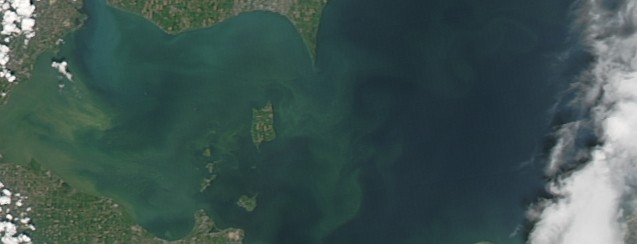
Biosensor detects toxins in water sources
UC environmental engineers’ research featured in NSF video
University of Cincinnati environmental engineers and chemists developed a biosensor to detect toxins in surface water such as streams, rivers and lakes. Funded through National Science Foundation (NSF) grants, the research was recently featured in an NSF video.
The research is led by Dionysios Dionysiou, professor of environmental engineering, and addresses the importance of detecting toxic products of cyanobacteria algal blooms, which are formed mainly by agricultural runoff. Project collaborators at UC include Vesselin Shanov, professor of chemical engineering; Ryan White, associate professor of electrical engineering and chemistry; and Bill Heineman, professor of chemistry.
The research team, including research assistant and environmental engineering Ph.D. student Vasileia Vogiazi whose work was featured in a previous article, created a sensor to identify and measure microcystins. These toxins are produced from algal blooms and can cause skin irritation, nausea or vomiting if swallowed, and liver damage if large amounts are ingested. Understanding the toxin’s impact on the water supply can aid water treatment plants to adjust the treatment strategy to keep these microcystins from contaminating drinking water.
Video courtesy of National Science Foundation.
Featured image at top: A satellite image of algal blooms on Lake Erie. Photo/Nasa.
Related Stories
Dark Energy Survey sheds light on expansion of universe
February 13, 2026
Astronomy talks to University of Cincinnati physicist Jessica Muir about an international project examining dark energy. The project could help explain why the universe is expanding at an accelerating rate.
Scientists: Slushy snowmelt isn’t just a nuisance
February 13, 2026
Slushy snowmelt isn’t just a nuisance, scientists say. It can send a toxic flood of road salt, sand and car exhaust, as well as dog poop, into rivers and streams, The University of Cincinnati College of Medicine's Yevgen Nazarenko, PhD, assistant professor of environmental and industrial hygiene in the Department of Environmental and Public Health Sciences, recently told The New York Times that research has shined a light on how pollution from all sorts of vehicles — planes, cars, trucks — can get trapped in the snow.
UC Alumni Association names top alumni award winners
February 12, 2026
The University of Cincinnati Alumni Association has announced this year’s recipients of its highest honors for UC alumni. The 2026 honorees include: Vinod K. Dham, CEAS ’77; Thomas D. Cassady, A&S ’76, Hon ’19; Padma Chebrolu, CECH ’92; Ryan C. Marable, PharmD, Phar ’13. Each year, the UC Alumni Association (UCAA) honors a select few of its more than 360,000 alumni based on their career accomplishments and contributions to the university and community, recognizing them during Alumni Week festivities each spring.
